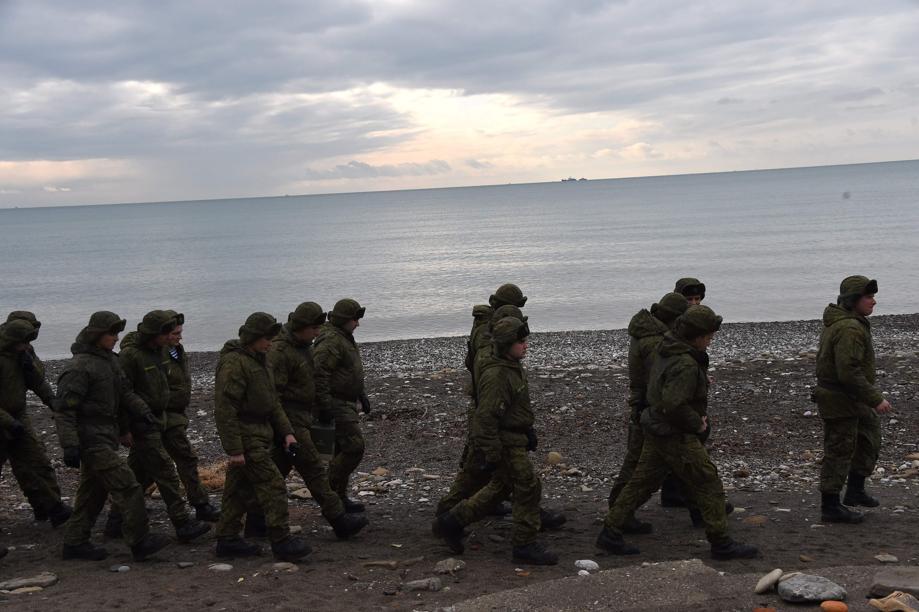
SOCHI, Russia — Russia mounted an expansive search-and-recovery operation in the Black Sea on Monday for the victims and the fuselage of a military passenger plane that crashed a day earlier, killing all 92 people on board, including dozens of members of an army musical ensemble.
Maxim Sokolov, the transportation minister, said terrorism had not been ruled out, but that it was unlikely to be the cause of the crash of the Tupolev 154.
Sokolov said at a news conference that the evidence recovered so far does not point to terrorism, “so we base our work on the premise that technical malfunction or pilot’s error caused the catastrophe.’’
The plane was flying to Syria for a New Year’s Eve concert for troops stationed at an air base near Latakia.
In Moscow, performers and ordinary citizens, some in tears, dropped flowers at the entrance to the headquarters of the musical group, the Alexandrov Ensemble.
Another mountain of red carnations and candles piled up outside the Ostankino television center as a tribute to nine journalists who were accompanying the group to the Khmeimim Air Base in Syria.
The plane was carrying 68 performers and staff members of the ensemble, an army choir and orchestra loved for its renditions of classical Russian songs and folk tunes.
The most likely area where the plane plunged into the water moments after taking off from the southwestern resort city of Sochi has been identified, Lieutenant General Viktor N. Bondarev, commander of the Russian air force, said at a news conference at the airport.
Bondarev said he did not expect the plane’s fin, where the flight recorders are situated, to be as damaged as the fuselage, raising hopes that the recorders might be intact. The recorders do not have underwater locator beacons, the Associated Press reported.
A large chunk of wreckage was located Monday on the seabed about a mile offshore, initially by sonar and then by divers, the Ministry of Emergency Situations announced.
The plane took off from Chkalovsky military airfield near Moscow and stopped in Sochi for refueling before crashing at 5:27 a.m. about a mile from the shore.
Some analysts have pointed to the possibility of terrorism, citing the sudden manner in which the airplane disappeared from radar screens and the absence of an emergency call from the pilot.
Officials said the airplane should have been technically sound because it underwent repairs and resumed service in December 2014, and the pilot was experienced and had 1,900 hours of flying time at the control of Tupolev 154s.
“The plane was technically fit,’’ Bondarev told the news conference. “The pilot was well-prepared.’’
Criminal investigators as well as a Defense Ministry committee are in charge of determining the cause of the crash.
Search efforts involving 45 ships and 135 divers continued Monday. The bodies of 11 victims, as well as dozens of body parts that have been recovered, were flown to Moscow for identification, Russian officials said.
The government discouraged relatives of those on board from coming to Sochi during what was expected to be a long recovery operation, and the few that have done so are being isolated.
Russia observed a national day of mourning Monday, with the main government television channels repeatedly playing mournful music and eulogizing those killed. A memorial service was conducted at a small chapel inside the Sochi terminal, with the airport’s employees and passers-by carrying flowers and candles.
The civilians on board included Yelizaveta P. Glinka, a prominent philanthropist who received a state award this month from President Vladimir Putin for her humanitarian work. She was taking a shipment of medicine to Syria. Glinka emigrated to the United States in 1986 and was married to Vermont lawyer Gleb Glinka.
“We never know if we will return alive, because war is hell on earth, and I know what I am talking about,’’ Glinka said at the award-presentation ceremony in the Kremlin. “But we are sure that goodness, compassion, and mercy are more powerful than any weapon.’’
In Khosta, a suburb of Sochi, security guards cordoned off a long strip of seashore. A number of men scoured the beach looking for traces of material from the doomed jet.
At a makeshift memorial heaped with flowers near Sochi’s old seaport, Oganes G. Melikyan recalled his old army friend, Valery M. Khalilov, who was the artistic director of the ensemble.
“He was extraordinarily intelligent with a great sense of humor,’’ Melikyan, a 58-year-old construction worker, said as he held photographs of the orchestra from his own days in the army. “Kind and good are not enough to describe him,’’ he said.
The Tupolev 154 was once a workhorse of the Soviet air transportation system. Most civilian airlines have phased them out, but they are still used by government agencies. The plane that crashed over the weekend was built in 1983.
Russia deployed military forces to Syria in September 2015, mainly air force bombers, to assist the government of Bashar Assad.
The Russian plane crash was the second tragedy in a week linked to Syria, after Moscow’s ambassador to Turkey was assassinated Dec. 19 by a Turkish gunman saying he was taking revenge for the siege of Aleppo.



